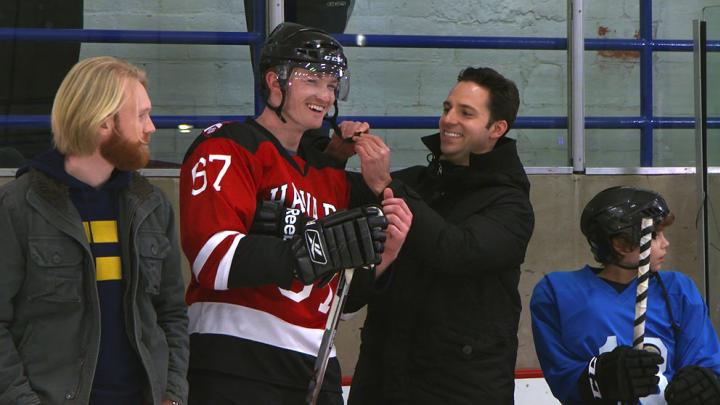Two years out of Harvard, government concentrator Bill Keenan ’09 was in his second season playing minor-league hockey in Sweden, still dreaming of his life-long desire to play in the NHL, when he was traded into the German league for a washer-dryer.
When he left the dream behind after the following season, he remembers thinking, “Hockey’s over. I’ll figure something else out.”
Since the start of 2019, he has released his second book, Discussion Materials: Tales of a Rookie Wall Street Investment Banker, a memoir of his two years as an investment banking associate at Deutsche Bank in New York City; joined the Graydon Carter start-up Air Mail, an international arts and culture email newsletter, as chief operating officer; and completed production of a movie set for release on September 1 based on his first book, Odd Man Rush, a rollicking recap of his three years bouncing across Europe. He is now turning his books into a television series.
“I try not to reflect too much on what’s happened because it feels like I’d be waking up from a dream,” says Keenan, now 34, and back living in Manhattan, where he grew up on the Upper East Side. “I’ve been incredibly lucky, and I think it’s 100 percent due to finding my way back to hockey people.”
Hockey has been an intrinsic part of his life since his parents bought him a pair of Bauer skates and a Sherwood hockey stick for his fifth birthday. So enamored was he of the sport and its culture that as a kid he began pronouncing words like “about” with a Canadian accent and asking friends to call him “Guy.” Reflecting on that early passion, he laughs and says, “My parents had no idea what they were getting themselves into.”
Now he’s back in his favorite milieu, all thanks to hilarious emails he sent to his former Harvard teammates describing life at the bottom rungs of minor-league hockey 4,000 miles from home. The missives go back to his Cambridge days, when he and his teammates would try to one-up each other after big hockey weekends, competing for who would could write the best one. “And that was a tough crowd to please,” he says.
Odd Man Rush—a hockey term describing when attacking players outnumber defenders—emerged from the enthusiastic reactions generated by those emails. When he finally gave up hockey and enrolled at Columbia Business School for an M.B.A., he drafted a manuscript that he began shopping to publishers. Like his injury-punctuated Harvard hockey career, and his European travails—including being exchanged for that appliance—it was a bumpy ride, he says. “I could’ve covered the walls of the five mansions I don’t have with all the rejection letters I got.”
When the book was finally published in 2016, an off-hand remark by a Deutsche Bank colleague about who would play him in the movie gave him the idea of adapting it for film. Serendipitously, he received an encouraging response from the first people to whom he emailed the script, producers Howard and Karen Baldwin. He knew that Howard Baldwin (whose father had played hockey at Harvard and graduated in 1933) had owned two NHL teams and that he and his wife had produced the fanciful hockey movie Mystery Alaska, as well as Oscar-nominated Ray.
“I tend to gravitate toward stories about the triumph of the human spirit, and Bill obviously had this passion for hockey,” says Baldwin, explaining what attracted him to the project. “I thought it was a cinch to succeed, and I liked the Harvard part of it.”
Whereas the book was a solitary endeavor, Keenan quickly found that making a movie is an exceedingly collaborative process, starting with the screenplay. Karen now calls him one of her “favorite people,” but first they had to work through their mutual stubbornness to forge a usable script. As he tends to do, Keenan uses hockey to describe that relationship. Working with Karen “was like having a teammate and talking about what you want each other to do on the power play. You don’t want to work with a pushover, and all we really were interested in was making the story better.”
As they await the film’s release in the United States and Canada on Amazon Prime Video and iTunes, the three are busy turning it into a television series. Karen Baldwin describes it as both a combination of Keenan’s two books and a natural sequel to the movie, with the three protagonists—Keenan’s character, Bobby; his best friend, Sully; and Bobby’s girlfriend, Erin—at a different stage of their lives. “It’s kind of like Friends—but with diversity,” she jokes.
Keenan sees Friday Night Lights as a road map to converting the movie into a television series, but unlike that venture, this one would use the same cast, including hockey scion and actor Trevor Gretzky as Sully.
Asked if he's finally over hockey, Keenan chuckles. "The NHL right now is still in the back of my mind," he admits, a testament to the grip the sport still has on him. "But the truth is, quitting hockey came at a point where I felt as good as I had in a long time, and I had an opportunity to go to a higher league in Sweden. But that's okay. What I needed to do was go out on my own terms, and in my world, I ended up going out on top."
What drives his character in the movie, and the proposed arc of the television treatment, says Keenan, is the question, "What do you do after your first love is gone?"
The real Bill Keenan seems to have skated his way to a satisfying answer.








